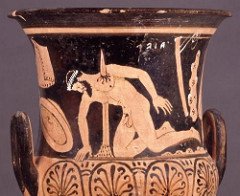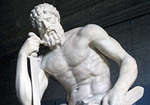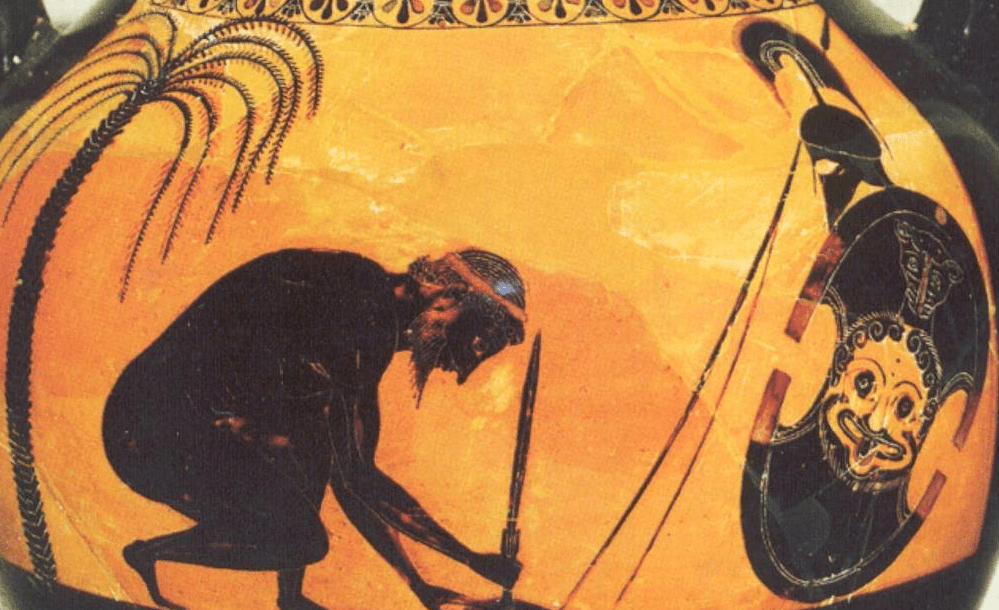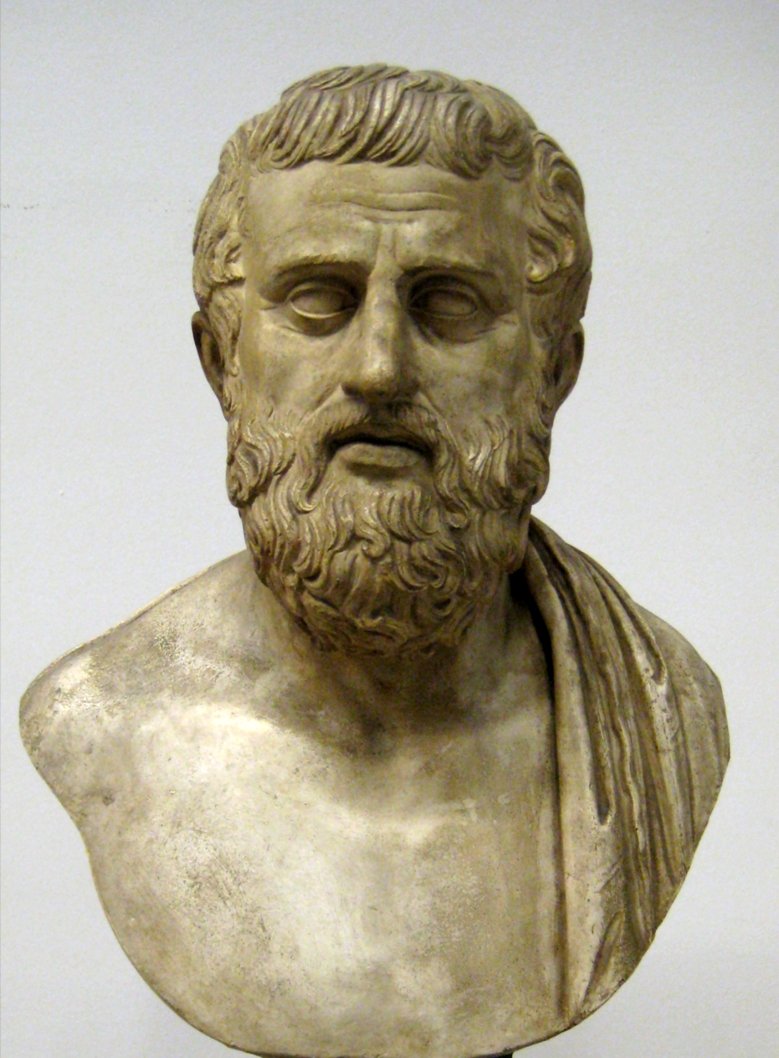
Ajax
Ajax by Sophocles
One of Sophocles’ earliest surviving tragedies, Ajax is set in the tenth year of the Trojan War, soon after the death of Achilles, and depicts the events of the last day of one of Ancient Greece’s greatest warriors, Ajax the Great. Defeated by Odysseus in the contest for the armor of Achilles—as we are informed at the beginning of the play in a discussion between Odysseus and Athena—Ajax tried to salvage his honor by sneaking in the night to murder the judges of the contest, Agamemnon and Menelaus. However, Athena stopped him right before he could do that by casting a fog over his eyes, as a result of which Ajax tortures and kills some cattle and sheep instead. As soon as Ajax returns to his senses and becomes conscious of his disgraceful deeds, he vows to commit suicide, thinking it the only way out of the humiliation. Tecmessa, his concubine and the mother of his son Eurysaces, tries to change his mind, and for a second, it seems that she manages to do that. However, as Calchas correctly predicts, this is merely a ploy: after tricking his wife and his friends into thinking that he has gone to perform a ritual purification of his sins, Ajax kills himself by jumping over Hector’s sword—given to him by the Trojan prince as a gift after their famous duel. Irritated by his stubbornness and unseemly behavior, Menelaus and Agamemnon try to forbid Ajax’s burial, but his half-brother, Teucer, insists on proceeding with it. Ultimately, Ajax’s arch-nemesis Odysseus settles the matter, by persuading Agamemnon to allow the burial because, personal rivalries aside, Ajax was indeed second only to Achilles in both bravery and courage.
Date and Historical Background
Tentatively dated to 445–440 BCE, Ajax may be the earliest of Sophocles’ seven surviving tragedies, perhaps performed a year or two before Antigone. However, due to insufficient information, there are many differing views, with some placing its first performance after Antigone, and others even in the first half of the 430s.
Characters and Setting
Characters
• Ajax, a famous Greek warrior, second only to Achilles in courage and strength under Troy
• Tecmessa, former Phrygian princess; Ajax’s spoil of war and his concubine
• Eurysaces, Ajax’s son with Tecmessa
• Odysseus, a legendary Greek hero, the wisest under Troy
• Agamemnon, supreme leader of the Greeks at Troy
• Menelaus, Agamemnon’s brother
• Athena, goddess of wisdom and war
• Teucer, Ajax’s half-brother
• Chorus of Salaminian sailors
• Messenger
Setting
The prologue and the first two episodes are set in front of the tent of Ajax at Troy; in the middle of the third episode, the play moves to the seashore.
Summary of Ajax
Prologue
It is early morning in the tenth year of the Trojan War, and outside Ajax’s tent in the Greek camp at Troy, the goddess Athena notices Odysseus scanning Ajax’s tracks to find out whether the great hero is inside his shelter or away. “There is no further need for you to peer inside these doors,” she says to him. “Just tell me what you want to know, and I, who hold all the knowledge, will reveal the truth to you.”
Odysseus discloses the reason behind his peculiar behavior: the night before, someone slaughtered the camp cattle, and the Greek leaders fear that this deed might have been done by none other than Ajax. Athena confirms Odysseus’ suspicions, telling him something even more alarming: if it hadn’t been for her intervention, instead of the animals, the victims would have been the Greek leaders.
Enraged at the fact that Odysseus—and not him—had been awarded the armor of the dead Achilles the day before, Ajax decided to kill the Greek leaders, but right before he reached the tent of the Atreides (Agamemnon and Menelaus), Athena “cast upon his eyes the tyrannous fancies of his baneful joy” and tricked him into thinking that the sheep and the cattle are, in fact, the Greek commanders. Ajax killed and mutilated most of them, taking a few back to his tent to torture, among them a ram which he imagines to be his main rival, Odysseus. To prove this, Athena summons Ajax out of his tent and mocks his evident madness while Odysseus goes into hiding and watches in disbelief.
First Parodos (First Entrance Song)
Concerned about the news they have just heard, a group of Ajax’s sailors (The Chorus of Salaminians) enters the stage and heads toward Ajax’s tent. They call for their leader to come out of his temporary abode and dispel the vicious rumors which they doubt to be nothing more but a ploy by either the Atreides or Odysseus.
First Episode
Tecmessa, Ajax’s concubine, comes out before the Salaminians and addresses them as “dear friends.” Unfortunately, she reveals to them tearfully, the rumors couldn’t be more real. When asked by the Chorus to expand on this, Tecmessa recaps the incident from the night before in such great detail that the Salaminian sailors are unable to bear the story of Ajax’s humiliation.
Suddenly, a screaming sound comes out of Ajax’s tent: the hero seems to be calling for his son Eurysaces, and for Teucer, his half-brother. By the mournful sound of his voice, both Tecmessa and the Salaminian sailors realize that Ajax might be sane yet again. At the request of the Chorus, Tecmessa opens the door to the tent.
And, there, the gathered crowd sees Ajax—a giant of a man and once second only to Achilles among the Greeks at Troy—sitting in indescribable pain amidst a few animal corpses, his skin stained with blood, tears rolling down his eyes. In the lyrical song which follows—called a kommos (a lament)—Ajax asks his friends to kill him, but they refuse, imploring him to forget such a remedy since it is worse than his actual disease.
Ajax begs to differ: with one shameful act, he fears, he has erased all of his glorious deeds, and now his enemies are rejoicing and laughing in their tents at his misery. Even his father, Telamon—Ajax adds—would now prefer to see him dead rather than dishonored. Tecmessa tries to change his mind by reminding him that if he kills himself, she and her son would be taken as slaves by his enemies. Ajax ignores her pleas: he merely orders her to bring Eurysaces. She does, and, in a gentle scene, Ajax blesses his son to be both happier and bolder than him. Then he retreats to his tent to apparently end his life; the distraught Tecmessa follows him.
In the first stasimon, the Chorus laments Ajax’s destiny: “Yes,” they sing, “better hid in Hades is the man plagued by such a disease, he who by the lineage from where he springs is the noblest of the war-tried Achaeans, yet now is true no more to his inborn temperament, but wanders outside himself with alien thoughts.”
Second Episode
After some time, to the surprise of the Salaminian sailors, Ajax calmly comes out of his tent, followed by Tecmessa, his enamored concubine.
“The dread power of my oath is conquered,” he exclaims, “as is my unyielding will. For even I, who used to be so tremendously strong—yes, like tempered iron—felt my tongue's sharp edge emasculated by this woman's words, and I feel the pity of leaving her a widow and the boy an orphan among my enemies.”
Ajax announces that he will go to the meadows to ritually purify himself of his sins and bury the most precious of his war spoils: the sword of Hector, which the Trojan leader had given him as a gift of recognition of his bravery. He assures the Salaminians that the worst has now passed and that after he comes back from the meadows, he will apologize to the Atreides and, as one soldier should, accept their punishment and lead without any further hesitation.
Ecstatic to hear such great news, in the second stasimon, the Salaminian sailors rejoice , thanking the gods for lifting the fog from Ajax’s eyes.
Third Episode
A messenger arrives in the Greek camp and asks the Salaminian sailors about Ajax’s whereabouts. They tell him that he has gone to purge himself from his sins, but, to their surprise, he exclaims in horror: “Alas! Alas! Too late, then, was he who sent me on this errand—or I myself have come too slowly.”
When asked by the Salaminians, the Messenger reveals the nature of his fear: he had been sent that way by Teucer with a strict order to keep Ajax inside his tent, since Calchas, the great seer, had told him that the gods are angry with his half-brother and that their anger would disappear the next day. However, if he is left alone for the day—it is sure to be his last.
The Salaminians call for Tecmessa, and the Messenger repeats this prophecy to her as well: “if Ajax is away,” he notes laconically, “I have little hope for him.” Terrified, Tecmessa and hurries to Ajax with a few sailors, hoping to reach him before it is too late. The rest of the Salaminians rush off to Teucer to speed his arrival.
Everybody leaves, and the scene suddenly changes to reveal a lonely place on the seashore. Enters Ajax, a sword in his hand. He buries it in the ground behind a bush, with the blade pointing upward. After asking Zeus to ensure that his dead body is first found by Teucer and not by his enemies, and praying to the Erynnies to avenge him as soon as possible, Ajax falls upon his sword. “This is the last word that Ajax speaks to you,” he says with his dying breath. “The rest he will tell to the shades in Hades.”
Second Parodos (Second Entrance Song)
After failing to find Ajax, two teams of Salaminian sailors accidentally meet somewhere near Ajax’s suicide site. They hear a sharp cry:it is Tecmessa lamenting the death of her husband, blaming Athena and the gods for it, and dreading about the uncertain future of her and her son. The sailors join in the lament.
Fourth Episode
Teucer arrives at the scene and is informed by the Salaminian sailors that his half-brother is dead. Hurt and ruminating over the strange fate of Ajax to be murdered by the already fallen Hector, Teucer asks the sailors to take out his body so that he can be properly buried. At that moment, Menelaus appears, followed by his army.
He orders the sailors to not even dare to touch the body of Ajax lest they crave for death themselves. Asked by Teucer why should anyone obey his orders, Menelaus explains that Ajax—whom he describes as always stubborn even in his glory days—is no longer a friend of the Greeks: by turning against them, he has deserved to be treated as an enemy.
Teucer reminds Menelaus that Ajax had come to Troy because of him and his unfaithful wife Helen, and that he has always fought for Salamis, and thus has never been the subject to his orders (Menelaus was the king of Sparta). Menelaus doesn’t back down: he reiterates his command and leaves.
Teucer is determined not to obey Menelaus. He announces his intent to dig Ajax a grave no matter what the cost, and asks Eurysaces to hold the hand of his father and hug him before that, cursing anyone willing to put himself between this father and son bond.
In the third stasimon, the Salaminian sailors curse the day they had to leave for Troy and sing praises to Ajax, describing him as their bulwark, always their “defense against nightly terror and the darts of the foe.”
Exodos (Exit Song)
Just as Teucer prepares to dig the grave for Ajax, Agamemnon—perhaps notified and incited by his brother in the meantime—arrives authoritatively to the burial scene. Evidently irritated, he blames Teucer for grave disobedience and calls him a Barbarian slave, alluding to the fact that, through his mother, Teucer is a nephew of none other than King Priam (and, thus, cousin of Hector and Paris). “Though you are a nobody and a nothing,” Agamemnon says, “you have stood up for this other nothing lying here.”
“Full and foolish talker,” replies Teucer, “how dare you forget everything this man did for you?” And then he proceeds to list Ajax’s achievements, from singlehandedly saving the Greeks when trapped inside their defenses to confronting Hector in a single face-to-face combat. “It was this man who did those deeds,” he concludes, “and I, the slave, the son of the barbarian mother, was at his side.”
As the debate between Teucer and Agamemnon heats up, Odysseus suddenly appears, and, after learning the cause of the disagreement between the two and being granted permission, joins the discussion. “Even though he was hostile to me,” he says to the surprised Agamemnon, “it would be wrong to leave him unburied, for he was the best and bravest of all warriors, excepting Achilles.” After a brief discussion, Agamemnon backs down and grants the honor of a proper burial to Ajax—not because he is convinced that Ajax deserves one, but as a favor to Odysseus.
Teucer expresses his gratitude and admiration for Odysseus, but, even so, asks him to leave the burial site, fearing that the soul of Ajax might be offended if he remains. Odysseus accepts this decision and departs. As the burial service commences, the Salaminian sailors mournfully express a somewhat prosaic, but far-reaching truth: “Many things, I tell you, can be known through mortal eyes; but before he sees it happening, no one can foretell the future, or what his fate will be.”
A Brief Analysis
With its title character dead by mid-point, Ajax is a play of two halves: the former focusing on the madness of Ajax and the latter on the burial of his body. It is also a play of two conflicting moral codes: the traditional one of the old Homeric world, steeped in honor and bravery, and the one of the modern democratic Athens, infused with reason and objectivity.
Most of the characters in the play are old-world heroes: Agamemnon, Menelaus, Teucer, and—obviously and most significantly—Ajax. They all think rigidly, going so far to put their needs before the needs of the community, and observing almost everything around them in black and white colors. To them, people are either their enemies or friends, and neither of these two categories is set in stone. Ajax fought for Agamemnon and Menelaus out of a sense of duty and responsibility, but quickly changed his opinion about the Atreides after they offended his honor by handing over Achilles’ armor to Odysseus. Ironically, it is precisely because of this way of thinking that Ajax kills himself, firmly believing that his humiliating behavior (slaughtering the cattle) erases all of his past heroic deeds irretrievably. To Ajax, a hero is someone blameless and honorable, someone whose integrity cannot be doubted.
On the other side of the spectrum sits Odysseus, a proper hero for the new, democratic age of Ancient Greece. He is smart and flexible, moderate and reasonable—and he knows full well that peace is earned with cooperation and compromise. This allows him to be unbiased and objective, even when the matters at hand concern him personally. Moreover, this is why he is able to express his utmost respect for Ajax even while acknowledging that the Salaminian had been not only stubborn in his rigidity, but also an arch-rival of his.
Odysseus’ speech to Agamemnon at the end signifies the birth of a new moral code more suited for the democratic age of Athens, just as the suicide of Ajax in the middle of the play metaphorically embodies the death of the traditional, old-world devotees to honor and duty.
Ajax Sources
There are many translations of Ajax available online, both in verse and in prose; if you are a fan of the latter, you can read Richard Claverhouse Jebb’s translation for Cambridge University Press here. If, however, you prefer poetry, feel free to delve into Edward Hayes Plumptre’s blank verse adaptation here.
See Also: Sophocles, Ajax, The Madness of Ajax, Teucer
Ajax Video
Ajax Associations
Link/Cite Ajax Page
Written by: The Editors of GreekMythology.com. GreekMythology.com editors write, review and revise subject areas in which they have extensive knowledge based on their working experience or advanced studies.
For MLA style citation use: GreekMythology.com, The Editors of Website. "Ajax". GreekMythology.com Website, 09 Apr. 2021, https://www.greekmythology.com/Plays/Sophocles/Ajax/ajax.html. Accessed 25 April 2024.



